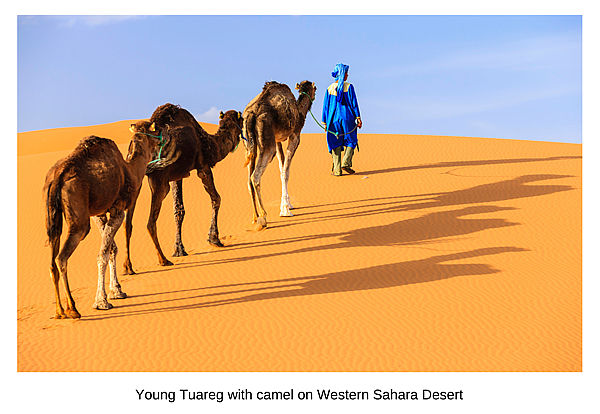
Western Sahara: Untamed Beauty in the Desert
Welcome to Western Sahara, a land of vast desert landscapes and rugged beauty on the northwest coast of Africa. This disputed territory, located between Morocco and Mauritania, offers a unique destination for adventurous travelers seeking an off-the-beaten-path experience. With its captivating desert scenery, rich cultural heritage, and resilient local communities, Western Sahara presents an opportunity to explore a land steeped in history and natural wonders.
Western Sahara is dominated by the vast expanse of the Sahara Desert, where endless stretches of golden sand dunes meet the azure Atlantic Ocean. Embark on a journey of discovery through this remote desert territory, where the silence of the dunes and the stark beauty of the landscape create an otherworldly atmosphere. Experience the thrill of camel trekking across the shifting sands, witness breathtaking sunsets over the dunes, and immerse yourself in the nomadic traditions of the local Bedouin communities.
As you traverse the desert, you will encounter ancient ruins and historical sites that tell the story of Western Sahara's past. From the ruins of the Al-Qasr fortress, once a thriving trade center, to the prehistoric rock art of Tifariti, these remnants of ancient civilizations offer glimpses into the rich heritage of the region. Explore the traditional Sahrawi villages, where you can learn about the customs, traditions, and way of life of the indigenous Sahrawi people, who have maintained their cultural identity despite the challenges they face.
For a short video introduction of Western Sahara, click below
Visa Requirements:
Visa requirements for Western Sahara may vary depending on your nationality and travel arrangements. As Western Sahara is a disputed territory, it's important to consult with relevant authorities or embassies to determine the specific visa requirements and entry regulations applicable to your situation.
Currency:
The currency used in Western Sahara is the Moroccan Dirham (MAD), as the region is administered by Morocco. It's advisable to exchange currency before entering Western Sahara or in major cities like Laayoune. Credit cards may be accepted in some hotels and larger establishments, but it's recommended to carry sufficient cash, especially when traveling to more remote areas.
Language:
Arabic is the official language of Western Sahara. French and Spanish are also commonly spoken due to historical influences. English is not widely spoken, so having a basic understanding of Arabic, French, or Spanish can be helpful for communication.
Connectivity and SIM Cards:
Mobile phone coverage in Western Sahara is generally available in urban areas. It's recommended to check with your service provider for international roaming options and coverage in the region. Local SIM cards can be obtained in larger cities, allowing for better connectivity during your stay.
Health and Safety:
When traveling to Western Sahara, it's important to take necessary health precautions. Ensure that your routine vaccinations are up to date and consider additional vaccinations such as hepatitis A and typhoid, depending on your travel plans. It's advisable to drink bottled water, avoid street food, and practice good hygiene to prevent foodborne illnesses. As with any travel destination, it's essential to take general safety precautions, including safeguarding your belongings and being aware of your surroundings.
Tourist Attractions Not To Be Missed
Dakhla: Located on a narrow peninsula along the Atlantic coast, Dakhla is a vibrant coastal city that serves as a gateway to Western Sahara's natural wonders. Experience the thrill of kitesurfing or windsurfing in the clear waters of Dakhla Bay, explore the picturesque white sand beaches, and savor the local seafood delicacies. Don't miss the opportunity to visit the nearby Dragon Island, a stunning natural reserve known for its rich marine life.
Laayoune: As the largest city in Western Sahara, Laayoune offers a glimpse into urban life in the region. Explore the lively markets, where you can find traditional crafts and souvenirs, and visit the Hassan II Mosque, a grand architectural masterpiece. Discover the history and culture of Western Sahara at the Sahrawi Museum, which showcases artifacts and exhibits that highlight the traditions and struggles of the Sahrawi people.
Smara: Immerse yourself in the cultural heritage of Western Sahara by visiting the desert city of Smara. Explore the old town, with its narrow streets and traditional adobe houses, and visit the Mausoleum of Sheikh Ma El Aïnin, a revered figure in Sahrawi history. Experience the unique atmosphere of the weekly camel market, where nomadic herders gather to trade their animals, showcasing the enduring traditions of desert life.
And for a final tip or trick:
Before embarking on a desert adventure, ensure that you are well-prepared with essential supplies such as sufficient water, sun protection, and appropriate clothing. The desert can be unforgiving, but with careful planning and respect for the environment, you can embark on an extraordinary journey through the untamed beauty of Western Sahara.
